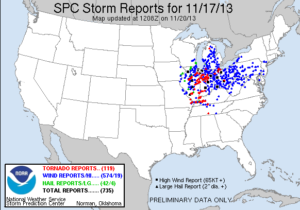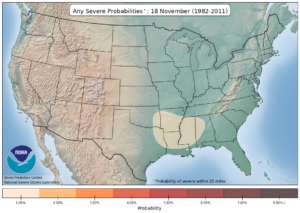GLOBAL WARMING: THE NEW POPULAR BOOGEYMAN
DID GLOBAL WARMING TRIGGER THE DEADLY NOVEMBER TORNADO OUTBREAK?
Certainly the devastating tornado outbreak of Sunday, November 17, will go down as one of the worst November onslaughts on record . . . but not the worst, at least in terms of the number of tornadoes. (It will be in 4th place.)
The image below shows where the severe weather—tornadoes, damaging winds—occurred. (Note: these are reports; some events may have been reported more than once. Greg Forbes, Severe Weather Expert at The Weather Channel, has confirmed 55 tornadoes, with 13 more pending.)

The image on the right (below) shows the climatology of severe weather for mid-November. Historically, there’s about a one percent probability of nasty storms on any given day in the middle of November in the tan-shaded portions of the Deep South.
Where the ugliness actually occurred was in areas where chances for such violence are far below one percent at this time of year. So what happened in the Midwest this past Sunday was indeed highly unusual.
When I was growing up in the PacNW, there was an unforgettable outbreak of super cold Arctic into the region on November 11, 1955. The event was unprecedented for so early in the season.
Temperatures plunged to near zero in western Washington and 13F in Portland, Oregon, where I lived. East of the Cascades, temperatures nosedived to well below zero in some spots. The Arctic air rushed in accompanied by snow and departed the same way. November 1955 is still the snowiest November on record in Portland.
The way-too-early Yukon Express caught everyone off guard. Houses weren’t winterized, snow tires weren’t mounted and the growing season hadn’t really ended. Thousands of fruit trees and ornamental shrubs literally froze to death.
In the wake of this extraordinary Big Chill, there was a hue and cry mounted that our hydrogen bomb testing in the remote reaches of the Pacific Ocean was screwing up the weather. It wasn’t, of course, and now we have a new popular boogeyman for every off-the-chart weather event that comes along: global warming.
Yes, the tornado outbreak earlier this week was exceptionally anomalous. But there have been others. For instance, a Great Lakes EF-4 tornado snuffed out 9 lives in 1911. That was quite awhile ago. So let’s take a deep breath before we tar and feather global warming and run it out of town on a rail. Tornadoes are triggered by a complex interaction of wind shear, instability and thermodynamics. To label global warming as a cause of the recent tragedy is, to be blunt, nonsense.
For some events, such as Superstorm Sandy, yes, a credible argument that global warming was at least a factor can perhaps be mounted. The patterns that influenced Sandy appeared truly unprecedented.
But not so for the tornado event currently under the magnifying glass. Without a doubt, the confluence of components that triggered the outbreak was highly unusual.
It has, however, happened before.